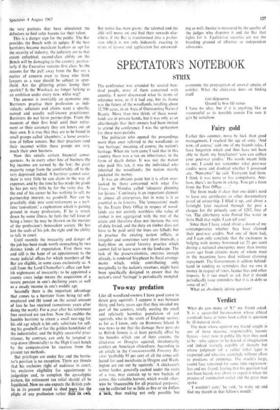SPECTATOR'S NOTEBOOK
STRIX
The conference was attended by several hun- dred people, most of them concerned with
amenity. I never discovered what its terms of reference were. or if it had any, but its theme was the future of the woodlands, totalling about 32,700 acres. in an Area of Outstanding Natural Beauty. More than two thirds of these wood- lands are in private hands, but it was only as an afterthought that their owners had been invited to attend the conference. I was the spokesman for these near-pariahs.
The politician who opened the proceedings more than once referred to the woodlands as 'our heritage,' meaning, of course, the nation's heritage. When my turn came I said that in this country there was a tax on inheritance, in the form of death duties. It was not the nation who paid this tax, it was the individual who inherited the woodlands; the nation merely pocketed the money.
It was an obvious point but it is often over- looked by those concerned with what The Times on Monday called 'adequate planning for leisure.' Continuity is an important element in almost all enterprises, but in none is it so essential as in forestry. The 'concessions' made by the Estate Duty Office in respect of wood- lands are not entirely worthless (the value of timber is not aggregated with the rest of the estate and therefore does not increase the rate of duty levied, and the duty on timber does not have to be paid until the trees are felled); but in practice the existing system inflicts, at irregular and sometimes very short intervals, a body-blow on sound forestry practice which cannot fail to leave scars on the landscape. The task of the preservationists, onerous enough already, is rendered Sisyphean by fiscal arrange- ments which, while contributing only marginally to the nation's revenues, might have been specifically designed to ensure that the nation's rural 'heritage' is periodically mangled.
Two-way predation
Like all woodland-owners I have good cause to detest grey squirrels. I suppose it was between thirty and forty years ago that they invaded my part of the country, totally ousting the small and relatively harmless population of red squirrels, who in the south of England survive. as far as I know, only on Brownsea Island. It was news to me that the damage these pests do to British forests is at least partially offset by the benefits which one of their cousins, the chickaree or Douglas squirrel, involuntarily confers on American silviculture. According to an article in the Commonwealth Forestry Re- view 'probably 95 per cent of all the cones col- lected for seed merchants in Oregon and Wash- ington are cut out by squirrels.' A chickaree's winter larder, generally cached under the roots of a tree, may contain up to two bushels of cones; this valuable harvest, which would other- wise be 'inaccessible for all practical purposes,' can be collected for as little as five or six dollars tritialt, thus making not only possible but
economic the propagation of several species of conifer. What the chickarec does on finding itself fort de'pourvu Quand la bise fat venue I have no idea; but if it is anything like as resourceful as its horrible cousin I'm sure it gets by somehow.
Fairy gold
Earlier this summer, more by luck than good management, I reached the age of sixty. 'And now, of course,' said one of my friends (alas, I have forgotten which and thus have not been able to thank my benefactor) 'you can collect your post-war credits.' His words meant little to me; I could not remember what post-war credits were and doubted whether I possessed any. 'Nonsense!' he said. 'Everyone had them. I think it was more or less compulsory. Any- how, there's no harm in asking. You get a form from the Post Office. . .
The form made it clear that one didn't need to have any certificates or other documentary proof of ownership. I filled it up, and about a fortnight later received through the post a cheque for the princely sum of £267, free of 'tax. The elderberry wine flowed like water in Strix Hall that night, I can tell you!
Since then I have asked about a dozen of my contemporaries whether they have claimed their post-war credits. Not one of them had, and I can only conclude that the exchequer is bulging with money borrowed (at 2f per cent) during a national emergency more than twenty years ago from citizens many of whom must in the meantime have died without claiming repayment. The Government is seldom behind!. hand in sending us reminders that we owe it money in respect of taxes, licence fees and other imposts. Is it too much to ask that it should periodically issue reminders that it is in debt to some of us?
What an absolutely idiotic question!
Verdict
'What do you make of X?' my friend asked. X is a successful businessman whose ethical standards have at times been called ir question by ill-natured rivals.
The man whose opinion my friend sought is one of those massive, impenetrable, laconic figures —rarer now in public life than they used to be--who appear to be devoid of imagination and indeed scarcely capable of thought but whose judgment (of a rather- tribal type) is respected and who rise seemingly without effort to positions of eminence. The oracle's large, round face remained for some time expression- less and my friend, fearing that his question had not been heard, was about to repeat it when the process of rumination ended and the great man spoke.
'I wouldn't care,' he said, `to wake up and find my thumb in that fellow's mouth.'






























 Previous page
Previous page